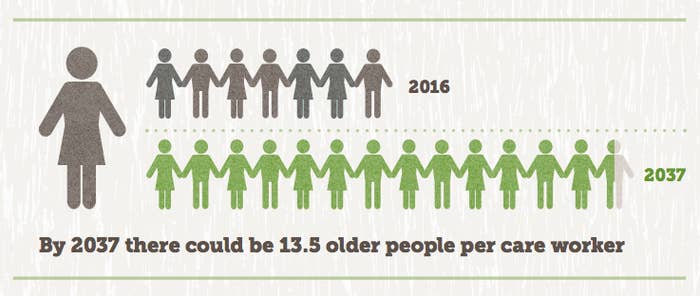
Elderly and disabled people in the UK will struggle to get the care they need if the 80,000 care workers from the EU who do not have UK citizenship are forced to leave the country after Brexit, a care charity has warned.
Independent Age said in a report released on Wednesday that not enough attention had been given to the impact of Brexit on the UK's social care staff.
The charity warned that the care industry relies heavily on EU and non-EU migration to boost its workforce and urged the government to consider this when negotiating the country's trade and immigration relationships with the rest of Europe.
Overall, one in five care workers in the UK was born outside the country, including 150,000 working in residential care homes and 81,000 in adult social care. In London, almost three in five care workers were born outside the UK.
Workers from the European Economic Area (EEA) – which is the 28 EU nations plus Iceland, Liechtenstein and Norway – make up 80% of new workers who have joined the sector in recent years.

Independent Age said that if there was zero inward migration after Brexit the industry would have a shortage of 1.1 million workers by 2037, meaning there would be one worker for every every 13.5 older people in care.
If migration continues at its current rate, the deficit would still be 750,000, and even with increased migration there would still be a gap of 350,000 by 2037, the charity said.
"The implications of a social care workforce gap of between 350,000 and 1.1 million workers for older and disabled people are clear – far fewer will be able to access the care they need to live meaningful, independent lives," the report said.
"To ensure it can continue to grow in line with the demands placed on it by rapid demographic change, the government needs to properly factor in adult social care into its plans for Brexit.
"If it fails to meet this challenge, not only will care workers lose out, but so too will older people who rely on the care and support provided by both British-born and tens of thousands of EEA nationals."
The report called on the government to guarantee the rights of EU nationals in the UK's care sector currently here, as well as make allowances for future migrants seeking care work.
The government has so far refused to offer any firm guarantees that EU migrants, even ones who have lived and worked in the UK for decades, will be able allowed to stay once the country leaves the EU.
The Home Office said in July it "expected" the legal status of EU migrants to be properly protected, but prime minister Theresa May has this would only happen if the status of UK nationals living in EU states was similarly protected.
Norman Lamb, Lib Dem MP and patron of the Vote Leave Watch pressure group, said in a statement: "Health workers on the front line could not be clearer that our social care services depend on workers from the EU. They look after us when we grow old or fall sick, and make a valuable contribution to our country.
"So it is unbelievable that the government is still threatening the possibility that EU citizens currently living in Britain might have to go home. And it is disappointing that they are considering implementing harsh immigration restrictions on these vital workers."
